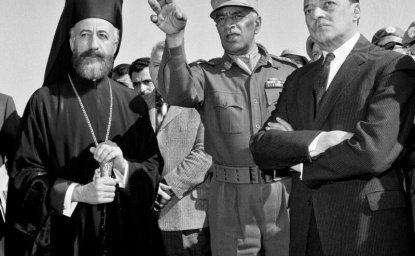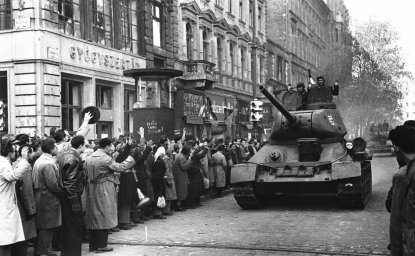By Martin Sherwin
In August 1949, the Soviet Union shocked the West by successfully testing an atomic bomb. The man behind the Soviet success was the physicist Igor Kurchatov.
Kurchatov was the father of the Soviet nuclear weapons program, overseeing all nuclear weapons and nuclear power programs from 1943 until his death from a stroke in 1960.
The PBS film Citizen Kurchatov: Stalin's Bomb Maker, which will premiere in Washington at the Woodrow Wilson Center on October 12, is a dramatic and penetrating view of the early nuclear arms race as seen from Moscow. It is a historical documentary designed to engage the attention of the general viewer, but should be of special interest to Cold War historians and political scientists, Soviet specialists, and historians of science.
The achievements of the Soviet nuclear weapons in the 1940s have been hotly debated in post-Soviet Russia. Former KGB operatives insist that their espionage successes were the key to the success of the scientists. Not surprisingly, Russian scientists insist that they didn't need espionage to build nuclear weapons. Stalin's Bomb Maker explores and evaluates this debate.
Like any good documentary, it asks basic questions:
* How did scientists live, work, and survive in Stalin's Soviet Union?
* Why did Soviet scientists work on nuclear weapons?
* What moral dilemmas confronted Kurchatov and his fellow scientists working on nuclear weapons for Stalin?
* Did Kurchatov seek to influence the politics of nuclear weapons?
* What was Kurchatov's relationship to Andrei Sakharov, father of the Soviet hydrogen bomb?
* What was Kurchatov's legacy?
American audiences may well perceive parallels between Kurchatov and J. Robert Oppenheimer, the American physicist who led the team that developed America's first atomic bomb.
Los Alamos scientists often said that atomic bombs could not have been produced by August 1945 had it not been for Oppenheimer's leadership. Soviet veterans of Kurchatov's laboratories say similar things about Kurchatov's leadership. Like Oppenheimer, Kurchatov was a charismatic personality able to inspire the scientists who worked under him.
But such parallels should not be overdone. While Oppenheimer may have been politically naive, Kurchatov was a skillful bureaucrat and a schrewd political operator. Kurchatov was a scientist open to Western ideas, but he also flourished under the anti-Western politics of his time, according to the film.
Kurchatov had to be politically aware to survive; he reported directly to Laventi Beria, the vicious and mercurial head of the KGB. The Kurchatov-Beria relationship is a fascinating part of the story. Failure was not an option; success was a matter of life or death for Kurchatov and his team. Additionally, Kurchatov intervened on behalf of many of his Jewish scientists to protect them from suspicious Soviet leadership.
At the film's screening on October 12, Brian Kaufman, the film's producer, and its associate producer, Ethan Pollock, and I will all be on hand to answer your questions and listen to your comments. I anticipate having a lively and stimulating discussion.

Cold War International History Project
The Cold War International History Project supports the full and prompt release of historical materials by governments on all sides of the Cold War. Read more




